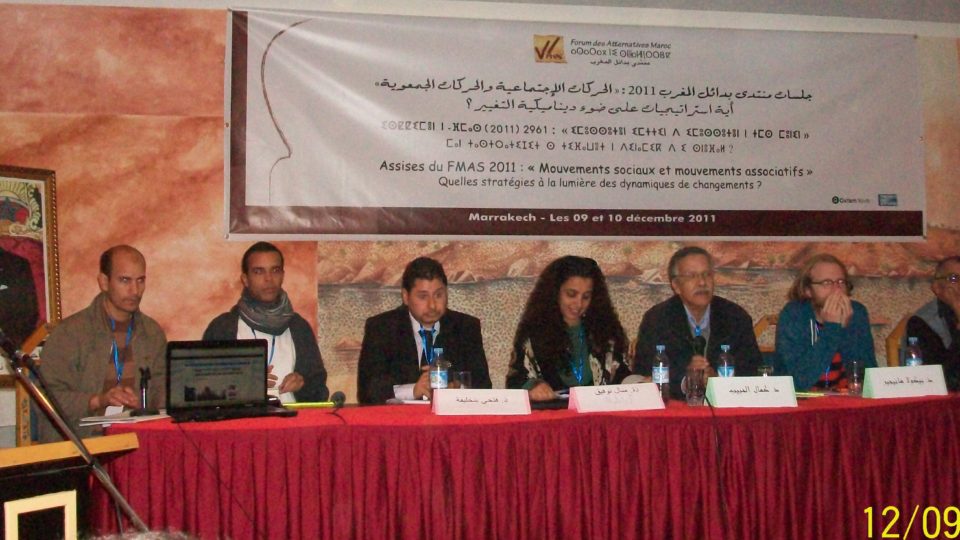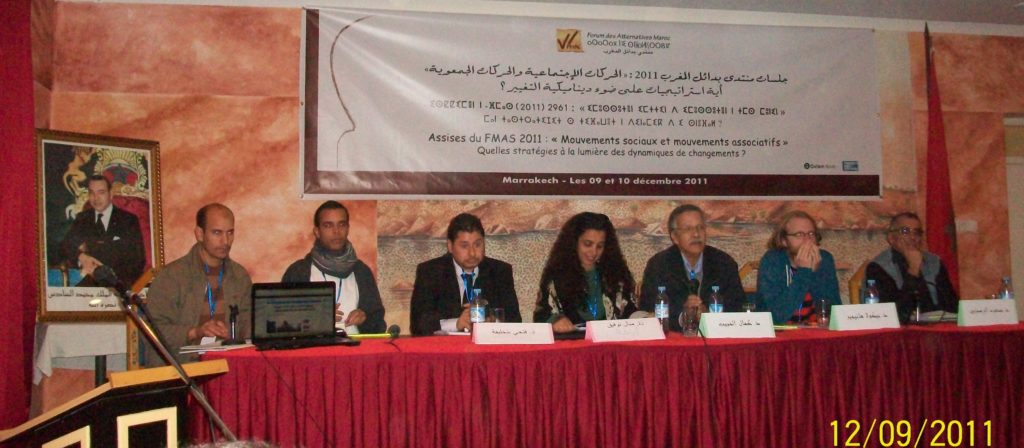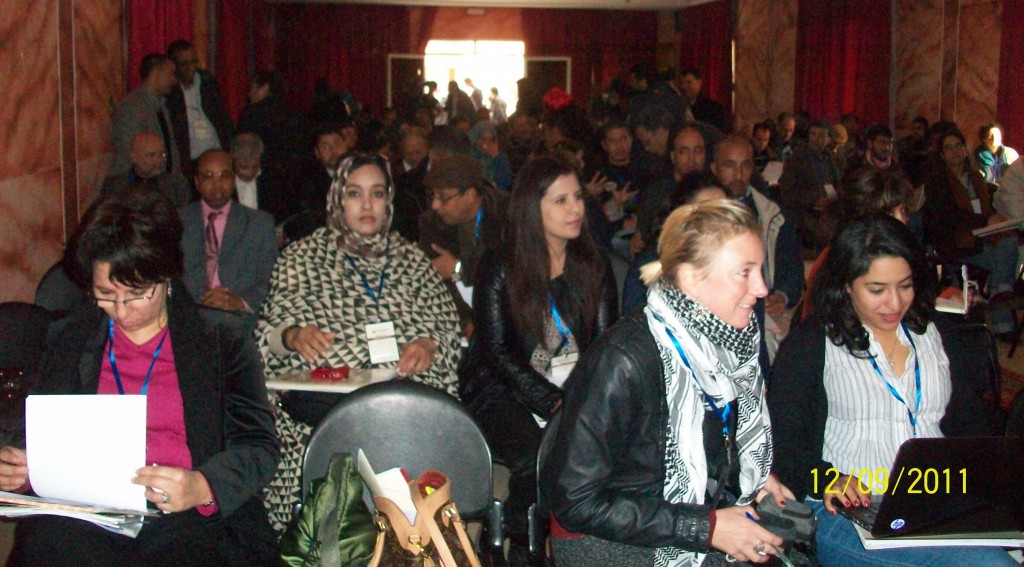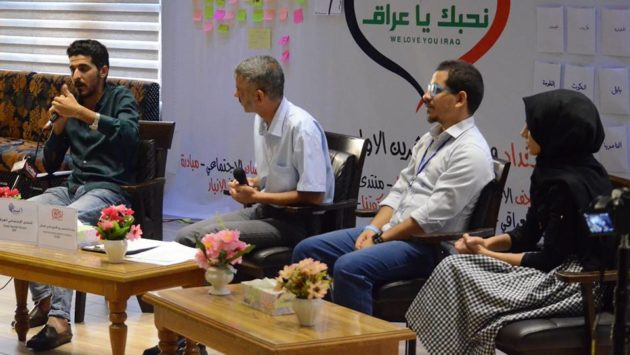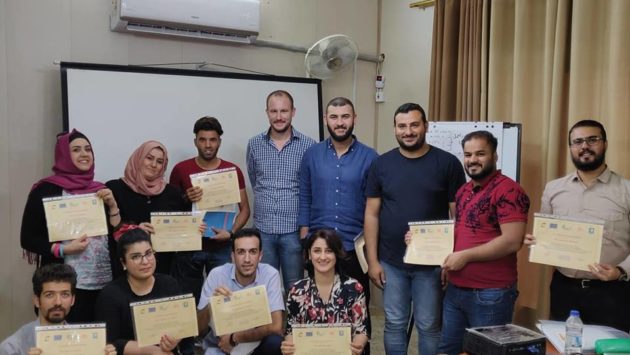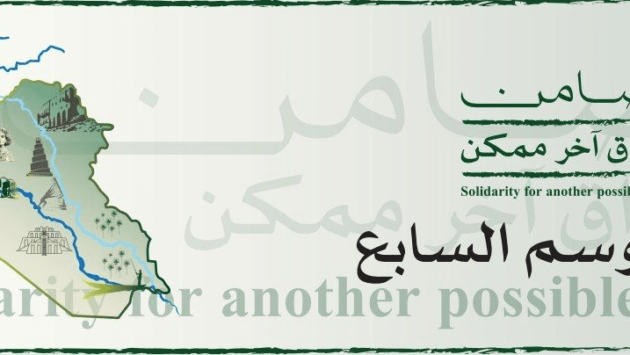Marrakech meeting: “What strategies for social movements in light of dynamic changes?”
At a time of dramatic change at both a regional and global level, “Forum des Alternatives Maroc (FMAS)” took place on the 9th and 10th of December 2011 in Marrakech, Morocco. More than 240 participants representing more than 95 networks and organizations participated in the meetings. The forum was open to participants from all over the world. Networks, platforms, social movements and trade unions from more than 18 countries within the Maghreb-Mashreq area, Africa, Latin America, and Europe, shared their work, experience, and expertise. The goal of the Forum was to encourage deeper examination and discussion of alternative strategies for social movements that will lead to the formulation of new, more creative proposals for action. The sessions were divided into two types:
1- Political overview sessions about changes in Morocco from a regional and a global perspective;
2 – Organizational sessions about the process of the Maghreb-Mashreq Forum and thematic forums on issues in the Maghreb-Mashreq region including youth, women, trade unions, emigration, and alternative media.
1- Political Overview Sessions
These sessions included discussion of the global economic crises of the neoliberal system and its implications for the economies of the region; the phenomena of “Political Islam” in the region; the role of youth and women in social movements; representative democracy and participatory democracy; and relations between civil society and the political regime in Morocco.
The new realty of “political Islam” in the region was a major topic at the meeting, because social movements are concerned about and even afraid of this development. There are very real contradictions inside Islamic political parties, which on the one hand may display democratic and human rights slogans on their banners while their traditional Islamic discourse includes negative positions about personal freedoms and the rights of women. This issue is especially critical as many countries expect to review and rewrite their constitutions in the near future. There is a real risk that they may see modern values and practices ended and they may lose the chance to promote truly democratic change. Another concern is that “political Islam” has no clear position about social equality and social justice; in fact some of these parties have hastily built relations with neoliberal powers as they seek international support to stay in power.
The concept of “stolen revolutions” was presented, in the sense that revolutions in the region were led by youth and women seeking more freedom and social justice, yet following the revolutions political Islam was able to win! So political Islam gained from the revolutions even though they were late to join in the social movements, especially in Tunisia, Morocco, and Egypt.
For these reasons, the aim of the social forums to encourage movements for alternatives has become essential for the future of the region. More work on democratic participation and on freedoms is urgently needed. The role of civil society came under criticism by those who felt that civil society has been used as a “cover-up” for the political regime! One example concerned the amendment of the Moroccan constitution: amendments were made with the participation of civil society however they included many contradictions between rights, freedoms and democracy supported by one side and “Islamic Language” supported by others that imposed traditional limits on women’s and personal rights. Some CSOs were saying, we took a pragmatic approach that preserved at least some of our freedoms while allowing us to play a role in the changes that are ongoing. Others say actually civil society was used to make this changes more acceptable and to legitimize these changes!!
A “Civil State” is what we are working for, a society where freedom of thought and freedom of expression are respected. The concept of a “Civil State” was presented and discussed in great detail. A Civil State is the opposite of a state based on religious and traditional authority which aims to create a society of believers (not free thinkers). These discussions ended with a call for social movements and civil society to work for the “civil state’s spring,” the “spring of equality.”
2 – Organizational Sessions: process of Maghreb Forum and thematic regional forums
This meeting was essential to review what has been done during the last two years and plans and strategy for the future.
Which forum will be in Tunisia? and when?
In the agenda it was planned to hold the 2nd forum for Maghreb, in Tunisia during 2012, this forum will be open to participants from all over the world. Others were talking about this forum to be a forum for Maghreb-Mashreq region (Arab countries). . A third proposal was to organize the 2nd Maghreb Forum and have it be open to the Mashreq region. It is legitimate to ask, “Why are there so many conflicting proposals?” During the discussion two main concerns emerged:
1- Politically, some Maghreb actors are afraid that a bigger forum will in the end become a forum only for Arabs. This might produce political clashes between Amazigi or Sahrawi, while a Maghreb forum would provide space for a variety of cultures other than Arabic culture.
2 –Technically, Mashreq dynamics are still developing. Representative participation is not assured, so there is a risk that any upcoming forum will in fact be a Maghreb Social Forum, even if it is called a “Maghreb-Mashreq Social Forum.”
The first point was most strongly emphasized in the discussions, however the majority were still in favor of a Maghreb-Mashreq Social Forum and the participation of social movements from other Arab countries. The final proposal was that the upcoming forum will be organized by the Maghreb process and open to Mashreq countries and the world. Egypt will host some meetings in December and January in order to prepare the Mashreq process. Iraqis will continue working on the Iraqi Social Forum; they will participate in the Tunisia Forum, where they will organize a session on Iraq.
The Tunisian delegates also proposed a change in schedule for logistical issues. They proposed to organize the forum during summer school, which will help insure that school facilities will be available. The proposal is now to hold the forum in Monastir, Tunisia, around the 12-15 of July 2012.
In parallel to the forum there will be a global meeting on the movements of “People of Protest” from all over the world. There will be an invitation to Occupy Wall Street (OWS) and other protest movements, and to the IC [international committee] meeting of the World Social Forum.
Thematic process in the Maghreb-Mashreq region:
The meeting included sessions on many important thematic issues.
- Forum on alternative media
- Forum on women’s movements in the Maghreb-Mashreq region that will be held in Morocco
- Forum on emigration that will also be in Morocco in Wajda city
- Forum on trade unions and workers’ movements
- Forum on Political Islam
- Forum on youth and youth participation in the Maghreb-Mashreq region
Most of the processes to create these forums are evolving and meetings or social forums still need to be organized in 2012. All Iraqi social movements and thematic groups (e.g. youth, women, trade unions, media) are invited to participate and to learn more about these processes. The final declaration will have a map of the places and dates for each thematic forum in the region.
At a time of dramatic change at both a regional and global level, “Forum des Alternatives Maroc (FMAS)” took place on the 9th and 10th of December 2011 in Marrakech, Morocco. More than 240 participants representing more than 95 networks and organizations participated in the meetings. The forum was open to participants from all over the world. Networks, platforms, social movements and trade unions from more than 18 countries within the Maghreb-Mashreq area, Africa, Latin America, and
Europe, shared their work, experience, and expertise. The goal of the Forum was to encourage deeper examination and discussion of alternative strategies for social movements that will lead to the formulation of new, more creative proposals for action. The sessions were divided into two types:
1- Political overview sessions about changes in Morocco from a regional and a global perspective;
2 – Organizational sessions about the process of the Maghreb-Mashreq Forum and thematic forums on issues in the Maghreb-Mashreq region including youth, women, trade unions, emigration, and alternative media.
1- Political Overview Sessions
These sessions included discussion of the global economic crises of the neoliberal system and its implications for the economies of the region; the phenomena of “Political Islam” in the region; the role of youth and women in social movements; representative democracy and participatory democracy; and relations between civil society and the political regime in Morocco.
The new realty of “political Islam” in the region was a major topic at the meeting, because social movements are concerned about and even afraid of this development. There are very real contradictions inside Islamic political parties, which on the one hand may display democratic and human rights slogans on their banners while their traditional Islamic discourse includes negative positions about personal freedoms and the rights of women. This issue is especially critical as many countries expect to review and rewrite their constitutions in the near future. There is a real risk that they may see modern values and practices ended and they may lose the chance to promote truly democratic change. Another concern is that “political Islam” has no clear position about social equality and social justice; in fact some of these parties have hastily built relations with neoliberal powers as they seek international support to stay in power.
The concept of “stolen revolutions” was presented, in the sense that revolutions in the region were led by youth and women seeking more freedom and social justice, yet following the revolutions political Islam was able to win! So political Islam gained from the revolutions even though they were late to join in the social movements, especially in Tunisia, Morocco, and Egypt.
For these reasons, the aim of the social forums to encourage movements for alternatives has become essential for the future of the region. More work on democratic participation and on freedoms is urgently needed. The role of civil society came under criticism by those who felt that civil society has been used as a “cover-up” for the political regime! One example concerned the amendment of the Moroccan constitution: amendments were made with the participation of civil society however they included many contradictions between rights, freedoms and democracy supported by one side and “Islamic Language” supported by others that imposed traditional limits on women’s and personal rights. Some CSOs were saying, we took a pragmatic approach that preserved at least some of our freedoms while allowing us to play a role in the changes that are ongoing. Others say actually civil society was used to make this changes more acceptable and to legitimize these changes!!
A “Civil State” is what we are working for, a society where freedom of thought and freedom of expression are respected. The concept of a “Civil State” was presented and discussed in great detail. A Civil State is the opposite of a state based on religious and traditional authority which aims to create a society of believers (not free thinkers). These discussions ended with a call for social movements and civil society to work for the “civil state’s spring,” the “spring of equality.”
2 – Organizational Sessions: process of Maghreb Forum and thematic regional forums
This meeting was essential to review what has been done during the last two years and plans and strategy for the future.
Which forum will be in Tunisia? and when?
In the agenda it was planned to hold the 2nd forum for Maghreb, in Tunisia during 2012, this forum will be open to participants from all over the world. Others were talking about this forum to be a forum for Maghreb-Mashreq region (Arab countries). . A third proposal was to organize the 2nd Maghreb Forum and have it be open to the Mashreq region. It is legitimate to ask, “Why are there so many conflicting proposals?” During the discussion two main concerns emerged:
1- Politically, some Maghreb actors are afraid that a bigger forum will in the end become a forum only for Arabs. This might produce political clashes between Amazigi or Sahrawi, while a Maghreb forum would provide space for a variety of cultures other than Arabic culture.
2 –Technically, Mashreq dynamics are still developing. Representative participation is not assured, so there is a risk that any upcoming forum will in fact be a Maghreb Social Forum, even if it is called a “Maghreb-Mashreq Social Forum.”
The first point was most strongly emphasized in the discussions, however the majority were still in favor of a Maghreb-Mashreq Social Forum and the participation of social movements from other Arab countries. The final proposal was that the upcoming forum will be organized by the Maghreb process and open to Mashreq countries and the world. Egypt will host some meetings in December and January in order to prepare the Mashreq process. Iraqis will continue working on the Iraqi Social Forum; they will participate in the Tunisia Forum, where they will organize a session on Iraq.
The Tunisian delegates also proposed a change in schedule for logistical issues. They proposed to organize the forum during summer school, which will help insure that school facilities will be available. The proposal is now to hold the forum in Monastir, Tunisia, around the 12-15 of July 2012.
In parallel to the forum there will be a global meeting on the movements of “People of Protest” from all over the world. There will be an invitation to Occupy Wall Street (OWS) and other protest movements, and to the IC [international committee] meeting of the World Social Forum.
Thematic process in the Maghreb-Mashreq region:
The meeting included sessions on many important thematic issues.
- Forum on alternative media
- Forum on women’s movements in the Maghreb-Mashreq region that will be held in Morocco
- Forum on emigration that will also be in Morocco in Wajda city
- Forum on trade unions and workers’ movements
- Forum on Political Islam
- Forum on youth and youth participation in the Maghreb-Mashreq region
Most of the processes to create these forums are evolving and meetings or social forums still need to be organized in 2012. All Iraqi social movements and thematic groups (e.g. youth, women, trade unions, media) are invited to participate and to learn more about these processes. The final declaration will have a map of the places and dates for each thematic forum in the region.
At a time of dramatic change at both a regional and global level, “Forum des Alternatives Maroc (FMAS)” took place on the 9th and 10th of December 2011 in Marrakech, Morocco. More than 240 participants representing more than 95 networks and organizations participated in the meetings. The forum was open to participants from all over the world. Networks, platforms, social movements and trade unions from more than 18 countries within the Maghreb-Mashreq area, Africa, Latin America, and
Europe, shared their work, experience, and expertise. The goal of the Forum was to encourage deeper examination and discussion of alternative strategies for social movements that will lead to the formulation of new, more creative proposals for action. The sessions were divided into two types:
1- Political overview sessions about changes in Morocco from a regional and a global perspective;
2 – Organizational sessions about the process of the Maghreb-Mashreq Forum and thematic forums on issues in the Maghreb-Mashreq region including youth, women, trade unions, emigration, and alternative media.
1- Political Overview Sessions
These sessions included discussion of the global economic crises of the neoliberal system and its implications for the economies of the region; the phenomena of “Political Islam” in the region; the role of youth and women in social movements; representative democracy and participatory democracy; and relations between civil society and the political regime in Morocco.
The new realty of “political Islam” in the region was a major topic at the meeting, because social movements are concerned about and even afraid of this development. There are very real contradictions inside Islamic political parties, which on the one hand may display democratic and human rights slogans on their banners while their traditional Islamic discourse includes negative positions about personal freedoms and the rights of women. This issue is especially critical as many countries expect to review and rewrite their constitutions in the near future. There is a real risk that they may see modern values and practices ended and they may lose the chance to promote truly democratic change. Another concern is that “political Islam” has no clear position about social equality and social justice; in fact some of these parties have hastily built relations with neoliberal powers as they seek international support to stay in power.
The concept of “stolen revolutions” was presented, in the sense that revolutions in the region were led by youth and women seeking more freedom and social justice, yet following the revolutions political Islam was able to win! So political Islam gained from the revolutions even though they were late to join in the social movements, especially in Tunisia, Morocco, and Egypt.
For these reasons, the aim of the social forums to encourage movements for alternatives has become essential for the future of the region. More work on democratic participation and on freedoms is urgently needed. The role of civil society came under criticism by those who felt that civil society has been used as a “cover-up” for the political regime! One example concerned the amendment of the Moroccan constitution: amendments were made with the participation of civil society however they included many contradictions between rights, freedoms and democracy supported by one side and “Islamic Language” supported by others that imposed traditional limits on women’s and personal rights. Some CSOs were saying, we took a pragmatic approach that preserved at least some of our freedoms while allowing us to play a role in the changes that are ongoing. Others say actually civil society was used to make this changes more acceptable and to legitimize these changes!!
A “Civil State” is what we are working for, a society where freedom of thought and freedom of expression are respected. The concept of a “Civil State” was presented and discussed in great detail. A Civil State is the opposite of a state based on religious and traditional authority which aims to create a society of believers (not free thinkers). These discussions ended with a call for social movements and civil society to work for the “civil state’s spring,” the “spring of equality.”
2 – Organizational Sessions: process of Maghreb Forum and thematic regional forums
This meeting was essential to review what has been done during the last two years and plans and strategy for the future.
Which forum will be in Tunisia? and when?
In the agenda it was planned to hold the 2nd forum for Maghreb, in Tunisia during 2012, this forum will be open to participants from all over the world. Others were talking about this forum to be a forum for Maghreb-Mashreq region (Arab countries). . A third proposal was to organize the 2nd Maghreb Forum and have it be open to the Mashreq region. It is legitimate to ask, “Why are there so many conflicting proposals?” During the discussion two main concerns emerged:
1- Politically, some Maghreb actors are afraid that a bigger forum will in the end become a forum only for Arabs. This might produce political clashes between Amazigi or Sahrawi, while a Maghreb forum would provide space for a variety of cultures other than Arabic culture.
2 –Technically, Mashreq dynamics are still developing. Representative participation is not assured, so there is a risk that any upcoming forum will in fact be a Maghreb Social Forum, even if it is called a “Maghreb-Mashreq Social Forum.”
The first point was most strongly emphasized in the discussions, however the majority were still in favor of a Maghreb-Mashreq Social Forum and the participation of social movements from other Arab countries. The final proposal was that the upcoming forum will be organized by the Maghreb process and open to Mashreq countries and the world. Egypt will host some meetings in December and January in order to prepare the Mashreq process. Iraqis will continue working on the Iraqi Social Forum; they will participate in the Tunisia Forum, where they will organize a session on Iraq.
The Tunisian delegates also proposed a change in schedule for logistical issues. They proposed to organize the forum during summer school, which will help insure that school facilities will be available. The proposal is now to hold the forum in Monastir, Tunisia, around the 12-15 of July 2012.
In parallel to the forum there will be a global meeting on the movements of “People of Protest” from all over the world. There will be an invitation to Occupy Wall Street (OWS) and other protest movements, and to the IC [international committee] meeting of the World Social Forum.
Thematic process in the Maghreb-Mashreq region:
The meeting included sessions on many important thematic issues.
- Forum on alternative media
- Forum on women’s movements in the Maghreb-Mashreq region that will be held in Morocco
- Forum on emigration that will also be in Morocco in Wajda city
- Forum on trade unions and workers’ movements
- Forum on Political Islam
- Forum on youth and youth participation in the Maghreb-Mashreq region
Most of the processes to create these forums are evolving and meetings or social forums still need to be organized in 2012. All Iraqi social movements and thematic groups (e.g. youth, women, trade unions, media) are invited to participate and to learn more about these processes. The final declaration will have a map of the places and dates for each thematic forum in the region.

